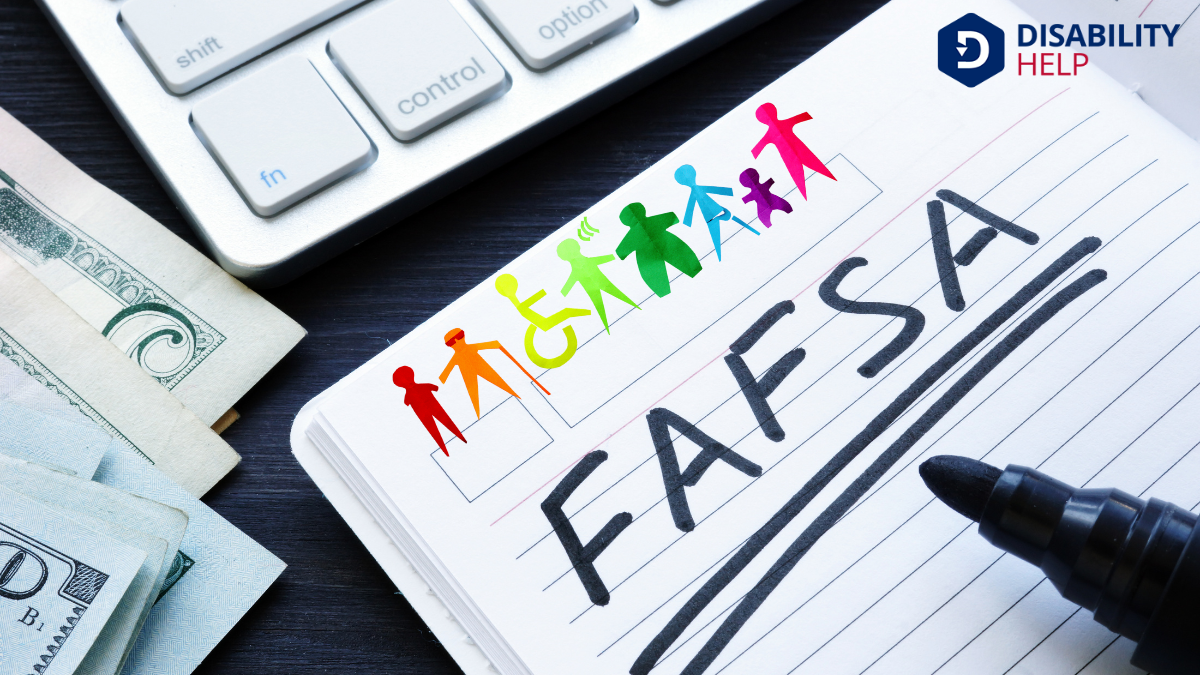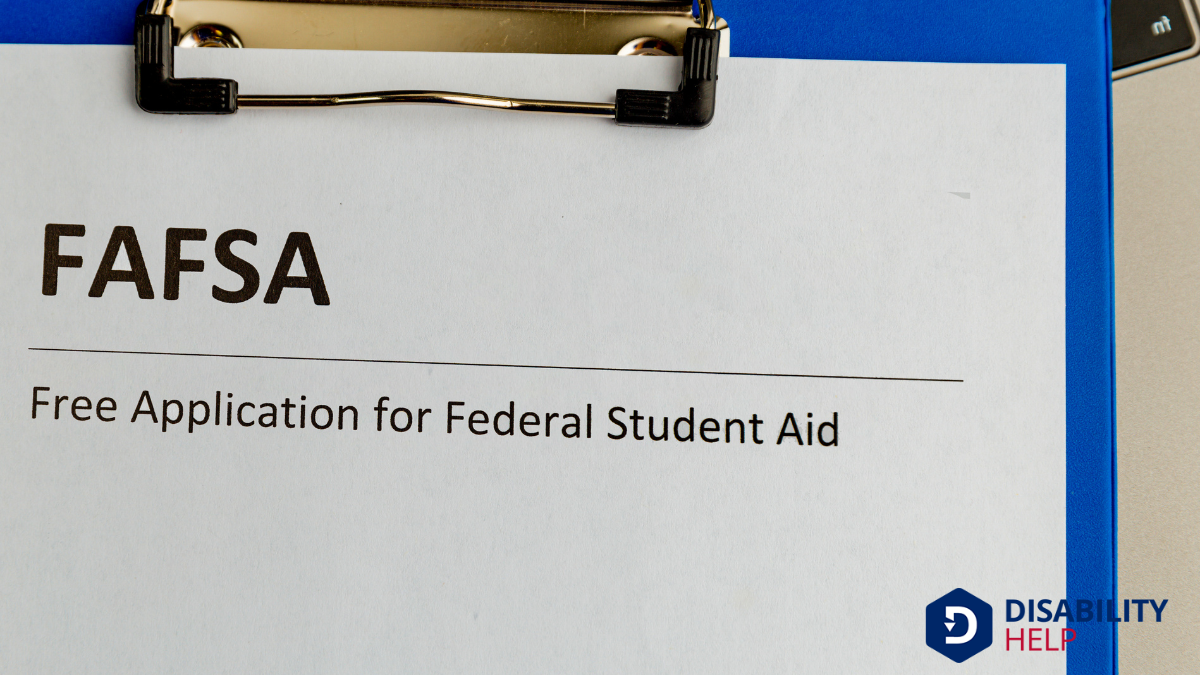When it comes to financial aid, understanding how FAFSA considers disabilities can meaningfully impact your educational journey. You might wonder if having a disability affects your eligibility or the amount of aid you receive. While FAFSA doesn't define disability precisely, it does account for how disabilities may influence your financial situation. Curious about how this works and what steps you can take to optimize your aid? Let's explore further.
Key Takeaways
- FAFSA lacks a strict disability definition; it considers impacts on work and learning.
- Disability-related expenses can adjust financial needs assessments for increased aid.
- Documentation from medical professionals may be required for disability verification.
- Schools may modify aid packages based on unique disability-related costs.
- Communicate with financial aid offices for personalized advice and additional funding opportunities.
Understanding the Role of FAFSA in Financial Aid
When it comes to securing financial aid for college, understanding the role of the Free Application for Federal Student Aid (FAFSA) is essential. FAFSA is your gateway to accessing federal financial assistance, including grants, work-study opportunities, and loans. It evaluates your financial situation to determine how much aid you qualify for.
By completing the FAFSA, you’re not only opening the door to federal aid but also to potential state and institutional support. The process may seem intimidating, but with careful attention, it can be straightforward.
Defining Disability in the Context of FAFSA

Although steering through the FAFSA process can be complex, understanding how it defines disability is vital for students seeking additional support.
FAFSA itself doesn’t provide a strict definition of disability. However, it considers disabilities regarding how they affect your ability to work and learn. This can include physical, mental, or emotional conditions that create barriers to traditional education methods.
To reflect these challenges, you might need to include documentation from a medical professional or a disability services office.
Eligibility Criteria for Students With Disabilities
To determine eligibility for financial aid, it's essential to understand that students with disabilities must meet the same basic criteria as all applicants.
You need to fulfill several requirements to qualify for FAFSA. Here’s a simple breakdown:
- Citizenship or Eligible Non-Citizen Status: You must be a U.S. citizen or an eligible non-citizen to apply for federal aid.
- Valid Social Security Number: Confirm you have a valid Social Security number, which is necessary for identification and processing.
- Enrollment in an Eligible Program: You should be enrolled or accepted for enrollment in an eligible degree or certificate program at a qualifying institution.
Understanding these criteria helps confirm you’re on the right path toward securing the financial aid you need.
Special Considerations for Disabled Students
Maneuvering the financial aid process can be challenging, but there are special considerations for students with disabilities that can make it more manageable. You should know that FAFSA takes your unique circumstances into account.
For instance, if you have additional medical expenses due to your disability, you might qualify for more financial aid. Schools may adjust your financial needs assessment, considering these costs.
Additionally, some colleges offer specific scholarships or grants for disabled students. It’s essential to research these opportunities and reach out to the financial aid office at your desired institutions.
They can provide guidance tailored to your situation.
How to Indicate Disability on the FAFSA Form

Understanding how to indicate a disability on the FAFSA form is the next important step in accessing the financial support you need. Although the form doesn't have a specific section for disabilities, you can still guarantee that your circumstances are considered. Here’s how:
- Communicate with your school's financial aid office: After submitting your FAFSA, contact them directly to discuss additional documentation or forms that may highlight your disability-related expenses.
- Include medical expenses in the FAFSA: When calculating your financial needs, make certain to include any relevant medical expenses related to your disability. This provides a more accurate picture of your financial situation.
- Utilize the 'Special Circumstances' section: Use this part of the FAFSA to explain any unique financial burdens due to your disability, guaranteeing your situation is fully understood.
Available Financial Aid Programs for Students With Disabilities
Steering through the world of financial aid can be overwhelming, but several programs are specifically designed to support students with disabilities. You can explore options like the Federal Pell Grant, which doesn’t require repayment and is available based on financial need.
The Federal Supplemental Educational Opportunity Grant (FSEOG) offers additional support for those with significant need. Besides these, you might qualify for work-study programs providing part-time jobs to help pay for education expenses.
Many states have their grants or scholarships, so it’s essential to check local resources.
Don’t forget to explore disability-specific scholarships from organizations focused on supporting students with disabilities. These scholarships often consider both academic achievement and the unique challenges faced by individuals with disabilities, providing vital financial assistance.
The Impact of Disability on Expected Family Contribution (EFC)
Exploring financial aid options is just one part of managing education with a disability. Understanding the Expected Family Contribution (EFC) is vital, as it determines your financial aid eligibility.
Disabilities can impact your EFC in various ways, potentially lowering it, which may increase your eligibility for aid. Here’s how:
- Out-of-Pocket Costs: Expenses related to your disability, like medical bills and assistive devices, can reduce your available income, affecting your EFC calculation.
- Household Income: If your disability impacts your family's ability to earn income, this may lower your EFC.
- Asset Considerations: Certain assets needed due to a disability might be excluded from EFC calculations, which could benefit your financial aid package.
Understanding these aspects helps you navigate the financial aid process more effectively.
Documentation and Verification of Disability Status
When applying for financial aid, documenting and verifying your disability status is essential for ensuring accurate consideration of your unique circumstances.
First, gather all relevant medical records, evaluations, and letters from qualified professionals that detail your disability. These documents should clearly outline how your condition impacts your daily life and academic performance. It's important that this information is up-to-date and reflects your current situation.
Once you've compiled your documentation, submit it to your school's financial aid office as part of your FAFSA application.
Be proactive in verifying that your submissions are complete and received. If needed, follow up with a meeting to discuss any concerns or additional details. Clear communication helps financial aid officers understand your needs and tailor support accordingly.
Additional Resources and Support Services
Should you need further assistance beyond financial aid, a variety of additional resources and support services are available to help students with disabilities succeed in their academic pursuits.
These services guarantee you have the tools necessary to navigate your college experience effectively. Here are some key resources you might consider:
- Disability Support Services (DSS): Most colleges offer DSS, providing accommodationsModifications or adjustments in healthcare settings to support patients with disabilities. like note-taking assistance, extended test time, and specialized software.
- CounselingProfessional guidance to help individuals cope with emotional, mental, or social challenges, particu... and Psychological Services: Access to mental health support can be essential. These services offer counseling tailored to your needs.
- Career Services: These centers can guide you in career planning, internships, and job placements, assuring you're prepared for life after college.
Tips for Maximizing Financial Aid Opportunities
While support services provide invaluable assistance for students with disabilities, it's equally important to guarantee you're maximizing your financial aid opportunities.
Start by submitting your FAFSA as early as possible, even if you don't think you'll qualify. Early submission can increase your chances of receiving aid. Make sure to accurately report any disability-related expenses, as they can influence your aid package. Double-check all information to avoid errors that might delay processing.
Explore scholarships specifically for students with disabilities. Many organizations offer targeted financial support, and applying to several increases your chances.
Don't forget to communicate with your school's financial aid office. They can provide personalized advice and alert you to additional funding opportunities.
Stay proactive and regularly review your financial aid status for any updates.
Conclusion
In maneuvering through FAFSA with a disability, you're not alone. Guarantee you provide thorough documentation to accurately reflect your needs. Remember, disability-related expenses can adjust your Expected Family Contribution, enhancing your financial aid package. Stay informed on eligibility criteria and make use of available resources for support. By carefully completing your FAFSA form and leveraging the available support services, you can maximize your financial aid opportunities and focus on your educational journey.






